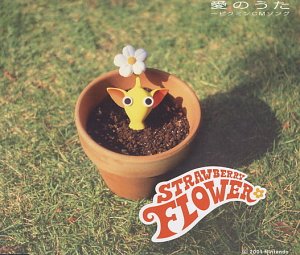- Ai no Uta (song)
Infobox single|
Name = Ai no Uta
Type = Single
Artist =Strawberry Flower
from Album =

Released =December 6 ,2001
Recorded = 2001
Genre =
Length =
Label =
Producer =
Reviews =
Last single =
This single = "Ai no Uta"
(2001)
Next single = "Pikmin Dance "
(2002) nihongo|"Ai no Uta"|愛の歌|Song of Love is animage song released in conjunction with thevideo game "Pikmin " for theNintendo GameCube. The song was only used in commercials for the game and does not appear in the game itself, and those commercials appeared only inJapan . A small clip of the song though can be heard being sung by the Pikmin in "Pikmin 2 ", and the song is one of the first ones available for the Distant Planet stage in "Super Smash Bros. Brawl " [cite web | url=http://www.smashbros.com/en_us/music/music22_list.html| title=First Songs in My Music - Smash Bros. DOJO!! | work= Nintendo] . The lyrics are in Japanese. The song is sung by the groupStrawberry Flower , who also produced the theme song for "Pikmin 2 ". The title of the song translates to "Song of Love," so named because the song expounds on the emotions the Pikmin feel in relation to their involvement in the game.When translated some of the lyrics include something like this.:"Plucked from the ground, gathered together, and ignored":"Yet we don’t ask that you love us"
The Pikmin are depicted to feel a kind of sadness, but also devotion to their given task of helping the game's
protagonist ,Captain Olimar .The song was featured in commercials for the "Pikmin" video game, in order to stimulate flagging sales. The song became immediately very popular and soon became one of the most recognizable songs in Japan at the time. Many people had memorized the song from the commercials, and soon after the sales of the video game rose nearly fivefold. The song itself was released as a
CD Single onDecember 6 ,2001 and remained in the top ten for several weeks. Unexpectedly, the song actually outsold the game it has advertised, beating "Pikmin's" sales figures shortly after its release as a single. The song was a remarkable media phenomenon in that it sold equally well to audiences of all ages and tastes. The largest purchasingdemographic of the song wasmiddle age d men.The b-side song, nihongo|"Namida Ga Afureta"|涙があふれた|Full of Tears, was the game's opening theme song, and was up-beat.
This single is rare and
out of print .Members at the Time of Single
From
Pikmin : Red Pikmin (debut), Blue Pikmin (debut), Yellow Pikmin (debut)Lyrics (English Translation)
"Uprooted, we'll follow you alone. /Today once again we'll carry, fight, multiply and be eaten. /Dug up, we'll meet again and be thrown around. /But we'll follow you forever.
I guess it's time to play. /Maybe we'll go out quietly. /Ah... ah... falling in love... /Under that sky...
On this planet, where so many life forms live, /Today once again we'll carry, fight, multiply and then be eaten. /Uprooted, we'll gather, and be thrown. /But we won't ask you to love us.
I guess it's time to play. /Maybe we'll try harder. /Ah, ah... falling in love... /Under that sky...
We'll work together, fight, and be eaten, /But we'll follow you forever. /We'll fight, be silent, and follow you, /But we won't ask you to love us."
The song can be heard in the Distant Planet stage in
Super Smash Bros. Brawl (there is also aFrench language version).[ [http://www.youtube.com/watch?v=esYm9q-bi4w YouTube - Pikmin - Ai no Uta (English Lyrics) ] ]
Music Video
The video was directed by
Satoru Iwata , the president and CEO ofNintendo . It mainly focuses on the Yellow Pikmin standing in front of a Toadmin decorated with TVs showing lightning that represents the emotions the Pikmin feel in relation to their involvement in the game. It was shot onSeptember 26 ,2001 .Track listing
#
#
# (Instrumental)References
External links
*
Wikimedia Foundation. 2010.
